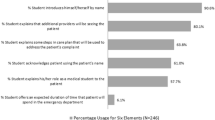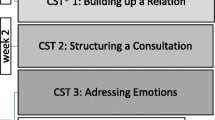Abstract
Medical students struggle to put into practice communication skills learned in medical school. In order to improve our instructional designs, better insight into the cause of this lack of transfer is foundational. We therefore explored students’ cognitions by soliciting self-evaluations of their history-taking skills, coined ‘judgments of satisfaction (JOSs)’. Our cognitive-psychological approach was guided by Koriat’s cue-utilization framework (J Exp Psychol Gen 126:349–370. doi:10.1037/0096-3445.126.4.349, 1997) which rests on the assumption that internal and external cues inform learners’ metacognitive judgments, which, in turn, steer their actions. Judgments based on unsuitable cues will cause ineffective behavior. Consequently, students are unable to adequately master these skills or properly apply them in similar situations. For the analysis, we had 524 medical undergraduates select scenes they were satisfied or dissatisfied with from their video-recorded simulated-patient encounters and explain why. Twenty transcripts were sampled for directed content analysis. We found that approximately one-third of students’ judgments focused on content (JOS-type-a); about half on the quality of the communication skills (JOS-type-b); and about ten percent targeted the appropriateness of the skills harnessed (JOS-type-c). This lack of reflection on appropriateness may explain why students experience problems adapting to new situations. It was primarily high-performance students who formed type-c judgments; poor performers tended to give type-a and type-b judgments. Future research would benefit from the use of our modified version of Koriat’s framework in order to further explore how high and poor performing medical students differ in the way they form JOSs during communications skills training.

Similar content being viewed by others
References
Aper, L., Veldhuijzen, W., Dornan, T., van de Ridderd, M., Koole, S., Derese, A., & Reniers, J. (2015). “Should I prioritize medical problem solving or attentive listening?” The dilemmas and challenges that medical students experience when learning to conduct consultations. Patient Education and Counseling, 98(1), 77–84. doi:10.1016/j.pec.2014.09.016.
ATLAS.ti GmbH. (1993–2014). atlas.ti7 qualitative data analysis. Berlin (Germany): ATLAS.ti GmbH.
Bombeke, K., Symons, L., Vermeire, E., Debaene, L., Schol, S., De Winter, B., & Van Royen, P. (2012). Patient-centredness from education to practice: The ‘lived’ impact of communication skills training. Medical Teacher, 34, E338–E348. doi:10.3109/0142159x.2012.670320.
Brown, J. (2010). Transferring clinical communication skills from the classroom to the clinical environment: Perceptions of a group of medical students in the United Kingdom. Academic Medicine, 85(6), 1052–1059. doi:10.1097/ACM.0b013e3181dbf76f.
Cavalcanti, R. B., & Sibbald, M. (2014). Am I right when I am sure? Data consistency influences the relationship between diagnostic accuracy and certainty. Academic Medicine, 89, 107–113. doi:10.1097/acm.0000000000000074.
Chen, R. C., Clark, J. A., Manola, J., & Talcott, J. A. (2008). Treatment ‘mismatch’ in early prostate cancer—Do treatment choices take patient quality of life into account? Cancer, 112, 61–68. doi:10.1002/cncr.23138.
de Bruin, A. B. H., Thiede, K. W., Camp, G., & Redford, J. (2011). Generating keywords improves metacomprehension and self-regulation in elementary and middle school children. Journal of Experimental Child Psychology, 109, 294–310. doi:10.1016/j.jecp.2011.02.005.
Dunlosky, J., & Rawson, K. A. (2005). Why does rereading improve metacomprehension accuracy? Evaluating the levels-of-disruption hypothesis for the rereading effect. Discourse Processes, 40, 37–55. doi:10.1207/s15326950dp4001_2.
Dunlosky, J., & Rawson, K. A. (2012). Overconfidence produces underachievement: Inaccurate self evaluations undermine students’ learning and retention. Learning and Instruction, 22, 271–280. doi:10.1016/j.learninstruc.2011.08.003.
Dunlosky, J., & Thiede, K. W. (2013). Four cornerstones of calibration research: Why understanding students’ judgments can improve their achievement. Learning and Instruction, 24, 58–61. doi:10.1016/j.learninstruc.2012.05.002.
Ericsson, K. A. (2008). Deliberate practice and acquisition of expert performance: A general overview. Academic Emergency Medicine, 15, 988–994. doi:10.1111/j.1553-2712.2008.00227.x.
Eva, K. W., Armson, H., Holmboe, E., Lockyer, J., Loney, E., Mann, K., & Sargeant, J. (2012). Factors influencing responsiveness to feedback: On the interplay between fear, confidence, and reasoning processes. Advances in Health Sciences Education, 17(1), 15–26. doi:10.1007/s10459-011-9290-7.
Flavell, J. H. (1979). Metacognition and cognitive monitoring. A new area of cognitive-developmental inquiry. American Psychologist, 34, 906–911. doi:10.1037/0003-066x.34.10.906.
Hampton, J. R., Harrison, M. J. G., Mitchell, J. R. A., Prichard, J. S., & Seymour, C. (1975). Relative contributions of history-taking, physical-examination, and laboratory investigations to diagnosis and management of medical outpatients. British Medical Journal, 2, 486–489.
Hawkins, S. C., Osborne, A., Schofield, S. J., Pournaras, D. J., & Chester, J. F. (2012). Improving the accuracy of self-assessment of practical clinical skills using video feedback—The importance of including benchmarks. Medical Teacher, 34(4), 279–284.
Hook, K. M., & Pfeiffer, C. A. (2007). Impact of a new curriculum on medical students’ interpersonal and interviewing skills. Medical Education, 41(2), 154–159. doi:10.1111/j.1365-2929.2006.02680.x.
Hsieh, H.-F., & Shannon, S. E. (2005). Three approaches to qualitative content analysis. Qualitative Health Reseach, 15, 1277–1288.
Hulsman, R. L., & van der Vloodt, J. (2015). Self-evaluation and peer-feedback of medical students’ communication skills using a web-based video annotation system. Exploring content and specificity. Patient Education and Counseling, 98(3), 356–363. doi:10.1016/j.pec.2014.11.007.
Kogan, J. R., Conforti, L. N., Bernabeo, E. C., Durning, S. J., Hauer, K. E., & Holmboe, E. S. (2012). Faculty staff perceptions of feedback to residents after direct observation of clinical skills. Medical Education, 46(2), 201–215. doi:10.1111/j.1365-2923.2011.04137.x.
Koriat, A. (1997). Monitoring one’s own knowledge during study: A cue-utilization approach to judgments of learning. Journal of Experimental Psychology-General, 126, 349–370. doi:10.1037/0096-3445.126.4.349.
Koriat, A. (2012a). The relationships between monitoring, regulation and performance. Learning and Instruction, 22, 296–298. doi:10.1016/j.learninstruc.2012.01.002.
Koriat, A. (2012b). The self-consistency model of subjective confidence. Psychological Review, 119, 80–113. doi:10.1037/a0025648.
Krippendorf, K. (2004). Content analysis. An introduction to its methodology. Thousand Oaks, CA: SAGE.
Kurtz, S., Silverman, D., & Draper, J. (2005). Teaching and learning communication skills in medicine. Oxford: Radcliffe.
Maguire, P., & Pitceathly, C. (2002). Key communication skills and how to acquire them. British Medical Journal, 325, 697. doi:10.1136/bmj.325.7366.697.
Martin, D., Regehr, G., Hodges, B., & McNaughton, N. (1998). Using videotaped benchmarks to improve the self-assessment ability of family practice residents. Academic Medicine, 73, 1201–1206.
Mayring, P. (2000). Qualitative content analysis. http://www.qualitative-research.net/index.php/fqs/article/view/1089/2385. Retrieved 21.10.2014, 2014.
Metcalfe, J., & Kornell, N. (2005). A region of proximal learning model of study time allocation. Journal of Memory and Language, 52, 463–477. doi:10.1016/j.jml.2004.12.001.
Nelson, T. O., & Narens, L. (1990). Metamemory: A theoretical framework and new findings. In G. H. Bower (Ed.), The psychology of learning and motivation (Vol. 26, pp. 125–173). New York: Academic Press.
Peterson, M. C., Holbrook, J. H., Vonhales, D., Smith, N. L., & Staker, L. V. (1992). Contributions of the history, physical-examination, and laboratory investigation making in medical diagnoses. Western Journal of Medicine, 156, 163–165.
Rosenbaum, M. E., & Axelson, R. (2013). Curricular disconnects in learning communication skills: What and how students learn about communication during clinical clerkships. Patient Education and Counseling, 91(1), 85–90. doi:10.1016/j.pec.2012.10.011.
Sandelowski, M. (2000). Combining qualitative and quantitative sampling, data collection, and analysis techniques in mixed-method studies. Research in Nursing and Health, 23, 246–255.
Schön, D. A. (1983). The reflective practitioner. How professionals think in action. Aldershot, GB: Ashgate.
Silverman, J., Kurtz, S., & Draper, J. (2005). Skills for communicating with patients. Oxford: Radcliffe.
Thiede, K. W., & Anderson, M. C. M. (2003). Summarizing can improve metacomprehension accuracy. Contemporary Educational Psychology, 28(2), 129–160. doi:10.1016/s0361-476x(02)00011-5.
Thiede, K. W., Anderson, M. C. M., & Therriault, D. (2003). Accuracy of metacognitive monitoring affects learning of texts. Journal of Educational Psychology, 95, 66–73. doi:10.1037/0022-0663.95.1.66.
Thiede, K. W., Dunlosky, J., Griffin, T. D., & Wiley, J. (2005). Understanding the delayed-keyword effect on metacomprehension accuracy. Journal of Experimental Psychology-Learning Memory and Cognition, 31, 1267–1280. doi:10.1037/0278-7393.31.6.1267.
van Loon, M. H., de Bruin, A. B. H., van Gog, T., & van Merriënboer, J. J. G. (2013). Activation of inaccurate prior knowledge affects primary-school students’ metacognitive judgments and calibration. Learning and Instruction, 24, 15–25. doi:10.1016/j.learninstruc.2012.08.005.
van Merriënboer, J. J. G. (1997). Training complex cognitive skills. Englewood Cliffs, NJ: Educational Technology Publications.
Williams, C., Cantillon, P., & Cochrane, M. (2001). The doctor–patient relationship: From undergraduate assumptions to pre-registration reality. Medical Education, 35(8), 743–747. doi:10.1046/j.1365-2923.2001.00978.x.
Wouda, J. C., & van de Wiel, H. B. M. (2013). Education in patient–physician communication: How to improve effectiveness? Patient Education and Counseling, 90, 46–53. doi:10.1016/j.pec.2012.09.005.
Yedidia, M. J., Gillespie, C. C., Kachur, E., Schwartz, M. D., Ockene, J., Chepaitis, A. E., & Lipkin, M. (2003). Effect of communications training on medical student performance. Journal of the American Medical Association, 290, 1157–1165.
Zolnierek, K. B. H., & DiMatteo, M. R. (2009). Physician communication and patient adherence to treatment a meta-analysis. Medical Care, 47, 826–834.
Acknowledgments
Our thanks go to Tim Dornan, who took the effort to discuss suitable steps for the qualitative analysis with us, to Jan van Dalen who provided an early draft of this work with useful ideas, to Angelique van den Heuvel for magically transforming our German/Dutch-English into English–English and to Michael Schmidts, Martin Lischka and Siegfried Meryn for supporting this study.
Author information
Authors and Affiliations
Corresponding author
Rights and permissions
About this article
Cite this article
Wagner-Menghin, M., de Bruin, A. & van Merriënboer, J.J.G. Monitoring communication with patients: analyzing judgments of satisfaction (JOS). Adv in Health Sci Educ 21, 523–540 (2016). https://doi.org/10.1007/s10459-015-9642-9
Received:
Accepted:
Published:
Issue Date:
DOI: https://doi.org/10.1007/s10459-015-9642-9




